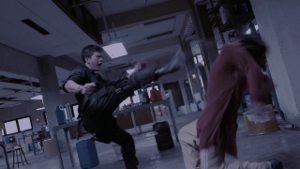
Having finally listened to my betters, we come now to the The Raid…or The Raid: Redemption as its North American distributor, Sony, insists on titling it. Because that was cheaper than paying the the people who own the rights to “The Raid” as a movie title. A vast and varied speculator market’s grown up around buying such things. It’s like buying website domain names: most just sit on ’em until some hungry company comes knocking. Then (the thinking goes) you can extort whatever you want from desperate suits sweating a national release date some other suit probably picked at random the year before.
But sometimes the suits wise up and think, Wait…we can just add a semicolon! And stick whatever bullshit we want on the other side! Nobody will know the difference! Nobody will care! Besides…it’s a Foreign Film…and no red-blooded American with an ounce of sense will dare mar their eyes with one of…those. All true…except in my case, because I’m a natural contrarian who grew up on Japanese sci-fi films. So I’ll watch anything once…unless an overwhelming majority of the pop culture critics I watch/read/respect start speaking in one voice.
Back in April, that unified Voice told me The Raid rocked and rocked hard. I didn’t pay ’em any attention. James Cameron’s incredibly gauche decision to re-release his incredibly profitable piece-of-shit, Titanic, on the centennial anniversary of the actual sinking of the Titanic…pretty much broke my brain until The Avengers patched it up and restored my faith in the human race…for all of five minutes. If I’d seen The Raid in theaters back when you were all telling me I should that might’ve lasted the full ten.
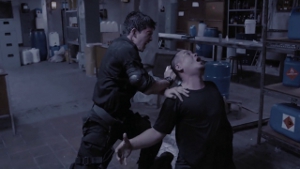
This is the second collaboration in as many films between Welsh director Gareth Evans, actor/martial artist Iko Uwais and fight coordinator Yayan Ruhian, built specifically to show off Indonesia’s indigenous martial art: pencak silat. Legend has it a woman named Rama Sukana once saw a bird (or a monkey, depending on who’s telling the tale) fend off a tiger and used those moves to defend herself from a group of drunken rapists. She taught the technique to her husband who passed it down to all who asked and so pencak silat became its region’s weapon of choice…until the Dutch arrived in the 16th century, bearing guns and STDs.
Like most South Asian martial arts, Silat grew out of a place where tribal warfare and foreign invasion were common, everyday things. The boundaries of the old Chinese Empire were more or less defined by indigenous martial arts, because an armored soldier ain’t worth shit against a peasant who can kick him off his horse. That’s how Tae Kwon Do and it’s ancestors kept the Chinese out of Korea…until the Mongols rolled everyone up into one Great Kahnate. From my admittedly distant perspective, silat seems to emphasize practicality over the poetry in motion that is most karate or the motion-as-poetry we ghost-faces call kung fu. Like judo, silat focuses control of yourself and whatever piece of your opponent you can grab. Unlike judo (or most kung fu) silat‘s not afraid to sacrifice grace in the name of dealing damage. The way Evans’ films it, silat seems designed to permanently cripple as quickly and efficiently as possible. Considering its special emphasis on preemptive strikes and juggling multiple attackers, I’m amazed the U.S. military hasn’t adopted it already. Guess the brass haven’t seen this film yet, either. Give them time. And since I’m about to heartily recommend everyone check out The Raid, the Pentagon’s officially out of excuses.
This is the part where people say, “The story isn’t much of a story,” but what they really mean is, “I was too entranced by all the fighting to really care.” It’s obvious Evans (who also wrote the script, as he’s done for his previous two films) designed this an excuse to stage every action scene he, Uwais and Ruhian could come up with, given the confines of their location. As with all action movies, this was a test of the filmmaker’s imagination, and they passed with flying (if muted…almost greyed-out) colors. But because that kind of imagination is on obvious display, it’s easier to focus on…much as I’ve been doing for the last five hundred or so words. But just because the plot is simple doesn’t mean the story isn’t complex. Just because that complexity’s concealed behind a wall of pulse-raising, close-quarter fight scenes doesn’t mean it isn’t there.
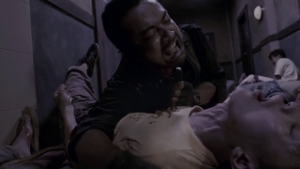
Usually it means the complexity lies in some manner of plot twist no one wants to “spoil,” making me even more contemptuous of our age’s growing fetish for Spoiler Warnings. As if there aren’t enough Evil Forces actively trying to infantilize us, we have to help them out by treating everyone and everything with kid gloves, dancing around subjects it’d be better to confront head on, because at least then we could actually discuss them like adults…without the need to throw SPOILER WARNINGS! around everything. That’s probably what kept me from hearing about the real mytho-poetic elements of this film, its biggest selling point for a guy like me.
Most consider The Raid a simple cops v. robbers movie set in the modern day slums of Indonesia’s capital, Jakarta. Iko Uwais plays Rama (see what Evans did there?), a rookie cop with a pregnant wife he has to leave in bed at five in the morning so he can go on the titular raid with his SWAT team. Said team’s assembled to bring in local drug lord Tama Riyadi (Ray Sahetapy), who’s set himself up as the landlord of a decrepit apartment building/drug lab. A good majority of Riyadi’s “tenants” are therefore gangsters, ready to defend the place from rival gangs…including the police. With the SWAT teaming coming up the stairs, Riyadi orders the building locked down and announces free room and board to anyone who helps rid the building of its latest “infestation.” Trapped six floors up with no back-up coming, Rama’s team must fight their way back downstairs through an army of anonymous gun- and machete-toting thugs.
Twenty men enter the building but we only really need to keep tabs on three: Rama, his superior officer, Sergeant Jaka (Joe Taslim), and Jaka’s superior, Lieutenant Wahyu (Pierre Gruno). The rest die entirely expected deaths and aren’t given much to do before that save heed their Sergeant’s hand signals. Separated in the confusion and gunfire, Rama spends a good deal of the second act dragging his injured comrade Bowo (Tegar Satrya) through the halls, but the two don’t have time to do much more than reinforce the idea Rama’s Our Good Guy.
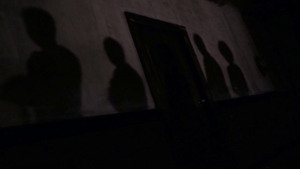
In case you forgot about the pregnant wife, we have an excellent scene where Rama takes down an entire floor’s worth of knife-wielding tenants. In case you think the film is completely bourgeois, Rama meets and allies himself with the One Good Tenant in the Building – a random dude with a sick wife the SWAT team met on the way in, who rabbited as soon as the shooting started. In case you thought this film too cynical, Rama and The Good Tenant have this exchange:
“Not every policeman is corrupt.”
“If I believe that, I would never have opened the door.”
Together, we have a picture of Rama The Idealist, meaning this is a movie about the day his ideals were sorely tested. I don’t think Uwais has gotten enough credit for this performance. As Beaten Down Idealists go, he’s more expressive and emotional than any American athlete-turned-actor I could readily name. Unlike his American counterparts, Evans isn’t afraid to show his protagonist suffer or recover from injury. Nor does he saddle them with an otherwise-useless character so someone’s around to prompt exposition. We know everything we need to know about Rama before his SWAT team departs their van. He’s the decent guy trying to be an honest cop in a city that (as Evans writes it) bears an uncomfortable resemblance to a pre-Batman Gotham City. The daylight between ganglord and landlord is pretty much microscopic and corruption’s infiltrated the highest levels of civic life. Either Our Hero’s going to stand firm against that…or wind up as corrupted by it as…well…everyone else seems to be.
Like Lieutenant Wahyu, who winds up trapped with Sergeant Jaka so the two can prompt exposition out of each other and we can learn this raid was no one’s idea but Wahyu’s. The film does a great job establishing Tama Riyadi as a monster-who-walks-like-a-man, but the script and Pierre Gruno do an even better job painting Wahyu as a sniveling, career-minded opportunist, traumatized by the maelstrom of blood and death his plans kick off.
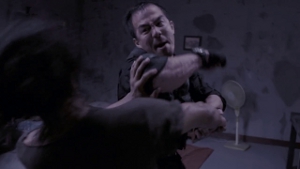
Jaka, on the other hand, would be the main character if an Idealist Rookie weren’t already prowling the halls. The tension between Corrupt and Incorruptible Cop propels all of his and Wahyu’s scenes, making a quieter counterpoint to the obvious tension of the well-done fights.
This eschews the tonal whiplash that hobbles some martial arts spectaculars and keeps sets up a parallel between the trinity of Rama, Jaka and Wahyu and the trinity Riyadi and his henchmen, Andi (Donny Alamsyah) and Mad Dog (Yayan Ruhian). Riyadi and Wahyu are two corrupt old men on opposite sides of the same tarnished coin, fat and secure in their places and the delusion they can get away with anything. Andi and Sergeant Jaka are the “brains” of their operations, meaning they’re both doomed to be the guy in the room with enough sense to call “bullshit” on the corrupt old men’s bad ideas. This leaves Riyadi’s enforcer and Number One Guy, Mad Dog, to parallel Rama. Both are maniacs of feet and fist (as Jaka describes Mad Dog) and both are willing to tear down walls for their boss…one a crime boss, the other his wife (thank you, I’ll be here all night). No wonder the two wind up in a Climactic Battle together.
Not that there was ever any doubt…but still, there’s more to this movie than a succession of five-minute fist-fights. There are plenty of those – they make up most of the running time – but they’d be meaningless wastes of disc space if I didn’t care about the characters involved. I care because they’re all well-drawn through deft cinematic artistry. There’s no fat on this picture. Unwieldy melodrama need not enter here. Its presence is unnecessary because the people making this movie took “Show, Don’t Tell” to heart, proving why it’s such a good maxim in the process.
The few things we are told exist to point us toward a theme. Three times we’re told Rama’s SWAT team isn’t here to do good. Rama, against all odds, decides to do good anyway. Evans is very aware his hero works up a double digit body count in the course of this bad day. And yet his presence reaches Andi, who comes out as Rama’s long-lost brother in the third act to the surprise of those mesmerized by the fight scenes (like yours humble narrator) and absolutely no one else. The parallelism continues unabated through the credits, but while The Raid began with two rivals it at least ends with two brothers. That’s hope, right?
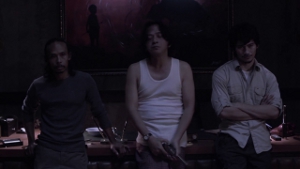
I guess it’s the best these characters can manage, trapped as they are in mentioned Matt Flannery’s cinematography. The world he filmed is stunningly beautiful for something so gray and worn down. There’s not a solid wall of paint or an un-chipped corner in this whole building, and I love it. Evans has described this as a “survival horror film” and he’s right, though some have gone further, calling it (in all seriousness and with not one hint of derision) a video game. I’d go the other way and call it an especially violent film noir: a quick peak into a dark world where moral absolutes don’t exist and shadows reach out of corners to snatch at you, like the machete wielders.
I could go on, but the point is this: do whatever it is you need to do to keep Evans and Uwais employed. Buy this film, own it, watch it. At this point, they’re officially on a streak, and I for one want to see how long they can keep this up. In an era of pre-packaged nostalgia and gutless PG-13 pablum it’s nice to see an action movie with a heart, soul, brain and decent directing style. I haven’t rambled on about a movie like this since my friends showed me Versus, and while The Raid didn’t make me cry tears of joy the way Kitamura’s film did back in 2001, it did restore my faith in the overblown martial arts films of 2011. At least one other person on Earth knows how to use a damn Dutch angle.
![]()
![]()
![]()
![]()
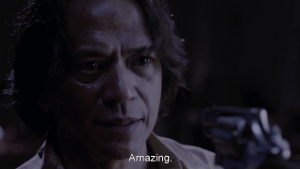

Obviously it’s just a coincidence, but holy crap the timing:
http://www.cracked.com/blog/the-most-baffling-subtitles-in-foreign-action-movie-history/
That’s nothin’. Check this, uploaded a few hours before my not-so-humble ramblings:
As my father used to say, “Great minds run in small circles.”
Cool! I’m totally seeing this flick when I can get my hands on it.
Then my job is officially done! Hope you enjoy it as much as my friends and I did.
I agree with your outcome on this movie. It was a wonderful flick, and I bought it shortly after renting it – definitely one to add to the list of “movies to watch when you just want to see a guy with a goal knife through a bunch of random guys sent as cannon fodder to slow him down”. One thing I would like to ask, though, is what is your opinion on The Raid’s plot and that of the new Judge Dredd movie? The scenes are very similar in the trailer: You have a slumlord who is running a decrepit appartment building, who makes a call over the intercom for residents to get rid of the police, and all sorts of other similarities.
With The Raid having been filmed and released first, is there any form of recompense being attributed to Evans and Uwais? Or is it a simple case of “We have a bunch of A-listers, so the little guy has to shut up and take it”?
I’ve thought about that a bit. It wouldn’t be the first time a major studio picture cribbed ideas from a cool Indy flick the director saw at a film festival during pre-production. Nor would it be the first time two people on opposite sides of the world had the same idea at the same time. Alexander Graham Bell may not have invented the telephone, but he got to the patent office first, so everyone says he did. The real questions are: Will Dredd be good enough in its own right to make me forget about The Raid completely, at least for the time I’m watching it? And will it be good enough to make me forget about the previous Judge Dredd movie? Especially since I already plan to review that in order to get the inevitable-if-temporary increase in traffic.